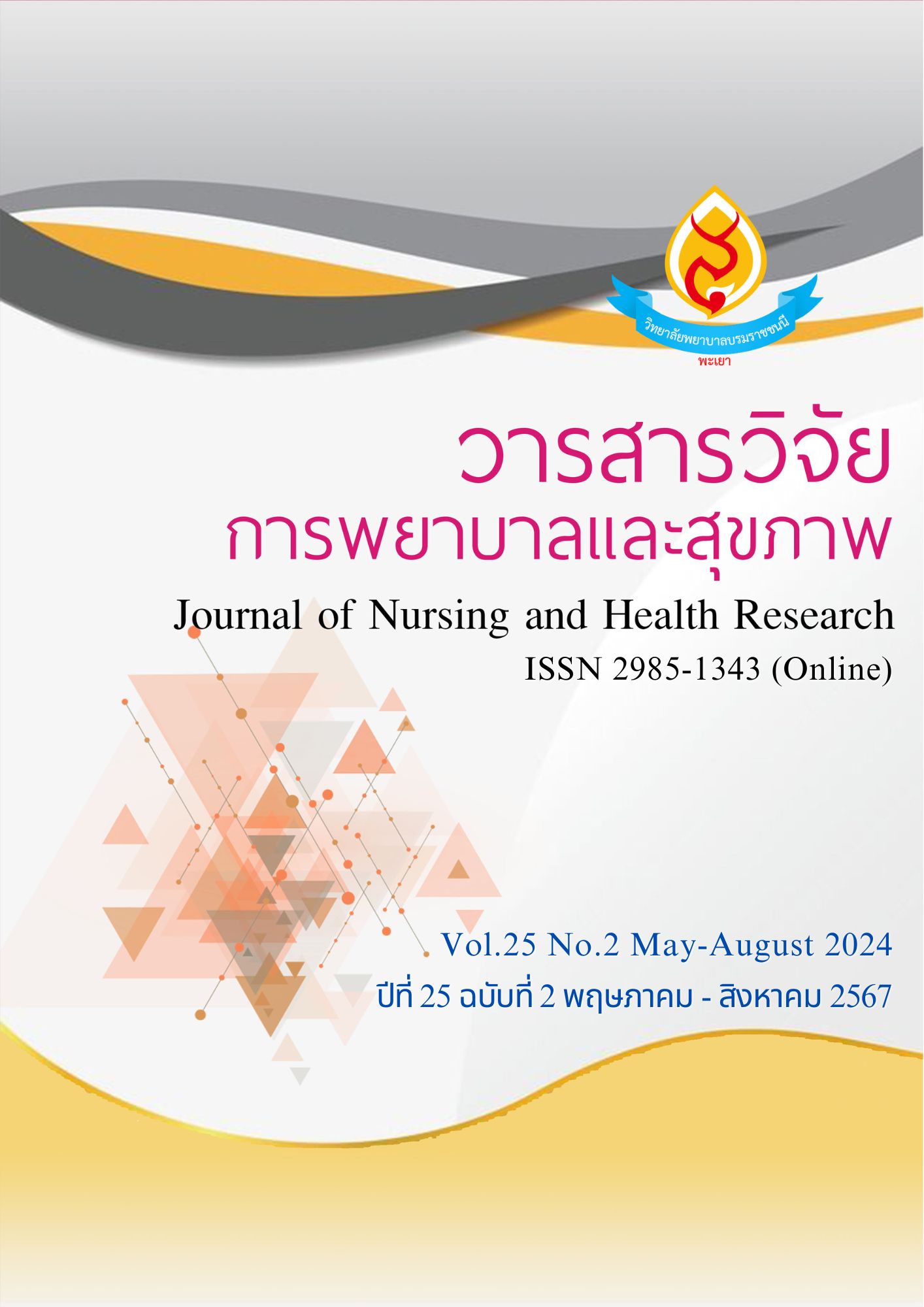ผลของโปรแกรมการจัดการตนเองในการใช้ยาลดความดันโลหิตของผู้ป่วยไตวายเรื้อรังระยะสุดท้ายที่ฟอกเลือดด้วยเครื่องไตเทียม
คำสำคัญ:
การจัดการตนเอง, การใช้ยาลดความดันโลหิตสูง, ผู้ป่วยไตวายเรื้อรังระยะสุดท้าย, การฟอกเลือดด้วยเครื่องไตเทียมบทคัดย่อ
อุบัติการณ์ของภาวะความดันโลหิตสูงในผู้ป่วยไตวายเรื้อรังระยะสุดท้ายขณะทำการฟอกเลือดด้วยเครื่องไตเทียมมีจำนวนเพิ่มขึ้น การส่งเสริมให้ผู้ป่วยมีการจัดการตนเองในการควบคุมความดันโลหิตจึงเป็นสิ่งจำเป็น งานวิจัยนี้เป็นวิจัยเชิงกึ่งทดลอง แบบหนึ่งกลุ่มวัดผลก่อนและหลังการทดลอง มีวัตถุประสงค์เพื่อศึกษาผลของโปรแกรมการจัดการตนเองในการใช้ยาลดความดันโลหิตของผู้ป่วยไตวายเรื้อรังระยะสุดท้ายที่ฟอกเลือดด้วยเครื่องไตเทียม กลุ่มตัวอย่าง คือ ผู้ป่วยไตวายเรื้อรังระยะสุดท้ายที่ฟอกเลือดด้วยเครื่องไตเทียมในโรงพยาบาลเชียงคำ จังหวัดพะเยา จำนวน 31 คน เครื่องมือที่ใช้ประกอบด้วย โปรแกรมการจัดการตนเองในการใช้ยาลดความดันโลหิตของผู้ป่วยไตวายเรื้อรังระยะสุดท้ายที่ฟอกเลือดด้วยเครื่องไตเทียม แบบบันทึกข้อมูลทั่วไป ความร่วมมือในการใช้ยาลดความดันโลหิตโดยการนับเม็ดยา แบบประเมินความรู้การใช้ยาลดความดันโลหิต และแบบประเมินพฤติกรรมการใช้ยาลดความดันโลหิต ทดสอบความเชื่อมั่นของเครื่องมือของแบบประเมินความรู้ฯ และแบบประเมินพฤติกรรม ฯ มีค่าสัมประสิทธิ์แอลฟาของครอนบาค เท่ากับ .97 และ .91 ตามลำดับ วิเคราะห์ข้อมูลโดยใช้สถิติเชิงพรรณนาและการทดสอบทีแบบจับคู่ ผลการวิจัย พบว่า หลังได้รับโปรแกรมการจัดการตนเอง ฯ กลุ่มตัวอย่าง มีคะแนนเฉลี่ยความรู้เรื่องการใช้ยาลดความดันโลหิต (t=12.93, p<.001) พฤติกรรมด้านการใช้ยาลดความดันโลหิต (t=9.55, p<.001) และความร่วมมือในการใช้ยาลดความดันโลหิต (t=7.07, p<.001) สูงกว่าก่อนได้รับโปรแกรมการจัดการตนเองฯ อย่างมีนัยสำคัญทางสถิติ นอกจากนี้ค่าเฉลี่ยระดับความดันโลหิตขณะหัวใจบีบตัว (t=7.56, p<.001) และขณะคลายตัว (t=4.22 p<.001) ลดลงกว่าก่อนได้รับโปรแกรมการจัดการตนเองฯ อย่างมีนัยสำคัญทางสถิติ ดังนั้น โปรแกรมนี้สามารถปรับใช้ในการดูแลผู้ป่วยไตวายระยะสุดท้ายในหน่วยไตเทียม เพื่อส่งเสริมพฤติกรรมการจัดการตนเองในการควบคุมความดันโลหิต
เอกสารอ้างอิง
Ayamuang, S. (2018). Effect of drug self-management supporting program on drug self-management behavior and blood pressure in adult post-hypertensive urgency patients. [Master of Nursing Science (Community Nurse Practitioner)]. Songkla University. http://kb.psu.ac.th/psukb/handle/2016/12980 (in Thai)
Bakris, G.L., Burkart, J. M., Weinhandl, E. D., McCullough, P. A., & Kraus, M. A. (2016). Intensive hemodialysis, blood pressure, and antihypertensive medication use. American Journal of Kidney Diseases, 68(5), 15-23. https://doi.org/10.1053/j.ajkd.2016.05.026
Bannakorn, P., Singweratham, N., Nawsuwan, K., & Phoophaniat, M. (2023). Effect of self-management program on glomerular filtration rate in hypertensive patients with stage 3 of chronic kidney disease. Journal of Nursing and Public Health Research, 3(2), 52-62. https://he02.tci-thaijo.org/index.php/jnphr/article/view/258896 (in Thai)
Chaiwan, W., Narin, R., & Tuanrat, W. (2022). Effects of a self-management program on medication adherence and blood pressure level among persons with hypertension in a community. Nursing Journal CMU, 49(3), 218–232. https://he02.tci-thaijo.org/index.php/cmunursing/article/view/256311 (in Thai)
Csaba P.K. (2022). Epidemiology of chronic kidney disease: an update 2022. Kidney International Supplements, 12(1), 7–11. https://doi.org/10.1016/j.kisu.2021.11.003
Health data center. (2024, June 8). Number of patients with chronic kidney disease receiving services at the hospital, classified by stage (Work Load). HDC-Dashboard. https://hdcservice.moph.go.th/hdc/reports/report.php?&cat_id=e71a73a77b1474e63b71bccf727009ce&id=47a33f6886e36962dec4bb578819ba64
Kanfer, F. H., & Gaelick-Buys, L. (1991). Self-management methods. In F. H. Kanfer, & Goldstein, A. (Eds.). Helping people change: A textbook of methods (4th ed.). Pergamon Press.
Kotchasenee, P. (2017). Essentials in hemodialysis (4th ed.). Text and Journal. (in Thai).
Leeprasert, L., & Sittilor, S. (2016) Effects of self-management support program for patients with diabetes mellitus and hypertension for delayed progressive chronic kidney disease stages 1-3 at Long Hospital, Phrae province. Journal of Phrae Hospital, 24(1-2), 49-62. https://thaidj.org/index.php/JPPH/article/view/4214 (in Thai)
Medical records Chiang Kham Hospital. (2024). Number of end-stage renal disease patients undergoing hemodialysis and hypertension before hemodialysis [report]. Chiang Kham Hospital. (in Thai)
Minutolo, R., Gabbai. F. B., Agarwal, R. Chiodini, P., Borrelli, S., Bellizzi, V., Nappi, F., Stanzione, G., Conte, G., & Nicola, L.D. (2014). Assessment of achieved clinic and ambulatory blood pressure recordings and outcomes during treatment in hypertensive patients with CKD: a multicenter prospective cohort study. American Journal of Kidney Diseases, 64(5), 744-752. https://doi.org/10.1053/j.ajkd.2014.06.014
Morfin, J.A., Fluck, R.J., Weinhandl, E.D., Kansal, S., McCullough, P.A., & Komenda, P. (2016). Intensive hemodialysis and treatment complications and tolerability. American Journal of Kidney Diseases, 68(5): 43-50. https://doi.org/10.1053/j.ajkd.2016.05.021
Phatiapinan, A., Torsakulkaew, T. & Leelahakul, V. (2018). The effects of self–management program of hypertensive patients with chronic kidney disease stage 3 on self–management behaviors and blood pressure. Thai Journal of Cardio-Thoracic Nursing, 29(2), 12-27. https://he02.tci-thaijo.org/index.php/journalthaicvtnurse/article/view/164276 (in Thai)
Phinage, C., Suwattanasin, A., Kongaun, W., Namwong, N., & Rengrila, S. (2020). The development of self-management support program for chronic kidney disease patients at pre-dialysis stage. Mahasarakham Hospital Journal, 17(3), 64-75. https://he02.tci-thaijo.org/index.php/MKHJ/article/view/247165 (in Thai)
Phuengchompoo, W. (2016). Nursing care of patients with chronic kidney disease receiving hemodialysis (2nd ed). Chiang Mai University Press. (in Thai)
Pinyo, S. & Jinawin, S. (2023). Effects of the self-management program on volume overload in end-stage renal disease patients receiving hemodialysis. Phrae Medical Journal and Clinical Sciences, 31(2), 48-59. https://thaidj.org/index.php/jpph/article/view/14514 (in Thai)
Pipatsombat, P., Kwanyuen, R., Jariyarattanakul, J. (2022). Effects of health literacy promotion program on medication adherence in Thai ageing. Kuakarun Journal of Nursing, 29(1), 89-102. https://he01.tci-thaijo.org/index.php/kcn/article/view/252379 (in Thai)
Rungsawang, S. (2017). Factors related to polypharmacy medication adherence among elderly people with chronic diseases. Siam University Nursing Journal, 18(3), 6-23. https://e-library.siam.edu/e-journal/wp-content/uploads/2019/05/JNSU-vol18-no35-jul-dec2017-1.pdf (in Thai)
Seephom, S., Prapaipanich, W., Jaanpanich, P., & Pichaiwong, W. (2014). The effect of self-management program for slow chronic kidney disease progression on knowledge, health behavior and blood pressure levels. Thai Journal of Cardio-Thoracic Nursing, 25(1), 16-31. https://he02.tci-thaijo.org/index.php/journalthaicvtnurse/article/view/26064 (in Thai)
Sittiwang, S., Aungwattana, S., & Tamdee, D. (2020). Effects of self-management promoting program on health behaviors and blood pressure level of persons with uncontrolled hypertension. Nursing Journal, 47(2), 85-97. https://he02.tci-thaijo.org/index.php/cmunursing/article/view/241799 (in Thai)
Sriwarakorn, S., Krittiyanunt, S., & Sakulbumrungsil, R. (2010). Sensitivity and specificity of Thai-version Brief Medication Questionaire. Journal of Health Research, 24(3), 129-134. https://www.thaiscience.info/journals/Article/JHRE/10893315.pdf (in Thai).
Sungkhao, M. & Thaniwattananon, P. (2020). Effect of self-management supporting program on medication adherence and blood pressure level among the older patients with uncontrolled hypertension. Journal of Research in Nursing-Midwifery and Health Sciences, 40(1), 84–100. https://www.nur.psu.ac.th/researchdb/file_warasarn/15309journal2.pdf (in Thai).
Thai Hypertension Society. (2019). 2019 Thai Guidelines on The Treatment of Hypertension. Thai Hypertension Society. (in Thai)
Wongkalasin, S. (2021). Development of management model of leftover medicine in patients with diabetes mellitus at Sakonnakhon Hospital [Doctor of Public Health]. Mahasarakham University. http://202.28.34.124/dspace/bitstream/123456789/1518/1/60011460016.pdf (in Thai)
Wongsaree, C. (2018). Factors predicting health self-management in end-stage renal disease patient receiving hemodialysis in a private hospital, Thailand. Journal of Nursing Science Chulalongkorn University, 30(3), 66-77. http://eresource.car.chula.ac.th/chula-ejournals/openpdf/openpdf.php?id=2979 (in Thai)
Yue, Z., Bin, W., Weilin, Q., & Aifang, Y. (2014). Effect of medication adherence on blood pressure control and risk factors for antihypertensive medication adherence. Journal of Evaluation in Clinical Practice, 21(1), 166-172. https://doi.org/10.1111/jep.12268
ดาวน์โหลด
เผยแพร่แล้ว
รูปแบบการอ้างอิง
ฉบับ
ประเภทบทความ
สัญญาอนุญาต
ลิขสิทธิ์ (c) 2024 วารสารวิจัยการพยาบาลและสุขภาพ

อนุญาตภายใต้เงื่อนไข Creative Commons Attribution-NonCommercial-NoDerivatives 4.0 International License.



